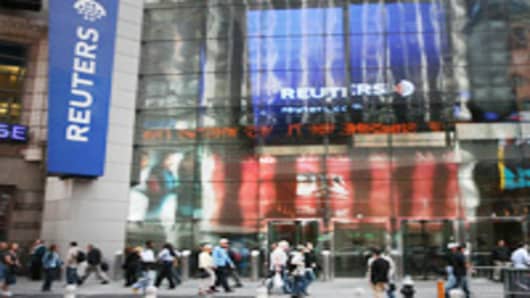Thomson sold The Times in 1981 and sharpened its focus on data publishing when it sold its North Sea oil interests in 1989 and Thomson Travel in 1998 and education business last year.
Reuters started in 1851 when German-born Paul Julius Reuter transmitted stock market quotes between London and Paris on the Calais-Dover cable.
Before that, he used pigeons to fly stock prices between Aachen in Germany and Brussels.
This was the beginning of the Reuters news service, which now has 2,400 journalists and became the foundation for a $5 billion-a-year news and financial data empire.
The new company, with headquarters in New York, has annual revenues of $12.5 billion, 50,000 employees and more than 40,000 customers in 155 countries.
Glocer, a former mergers and acquisitions lawyer, envisions a company that will provide "intelligent information" that people will pay for, he told Reuters in an interview.
"It's not just: 'Isn't it nice that instead of Reuters having 90 percent-plus concentration in financial, there'll be a more hedged, balanced portfolio," he said.
"What I think is more interesting is all of these units are going to work together over the long haul." The newly formed company's markets division with $7.4 billion in annual sales competes with Bloomberg LP for financial industry clients.
Bloomberg and Thomson Reuters each have about a third of the global financial data market, according to Atradia Consulting Director David Anderson.
Rivals also include Dow Jones, now a unit of Rupert Murdoch's News Corp, and Anglo-Dutch publisher Reed Elsevier.
Reed owns the LexisNexis legal database, a competing offering to Thomson's Westlaw, and competes with the company's $5.1 billion-a-year professional division.
To-Do List
The credit crisis, an economic downturn and meltdowns among investment banks such as Bear Stearns could hurt providers of financial data tools and products.
"A growing number of brokers, dealers, traders and banking staff will be sacked," Atradia's Anderson said.
The City of London alone could lose 40,000 jobs because of fallout from the U.S. subprime crisis and global credit crunch, according to JPMorgan.
Glocer, on the other hand, said the company was benefiting from hot demand for foreign exchange and energy data and was less exposed to problem areas like mortgage desks than rivals.
The group's first-quarter results next month will provide the first opportunity for a "candid outlook" for the enlarged group, Credit Suisse said.
Before then, investors will be wary of any analyst earnings downgrades, particularly amid the unwinding of arbitrage trades between the London and Toronto traded shares.
The company's immediate priority is to marry the Reuters array of financial products, such as the flagship 3000Xtra, with Thomson's products, such as ThomsonONE, which includes FirstCall company profit estimates.
Down the road, the challenge will be to integrate the financial products with the professional services.
Executives have said they want to achieve annual savings of $500 million within the first three years, with some of that coming from selling real estate as the enlarged group closes data centers and administrative offices it no longer needs.



